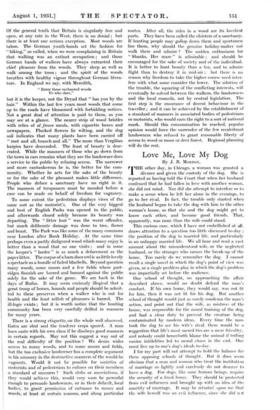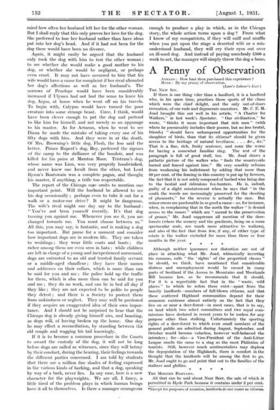Love Me , Love My Dog By J. B. MORTON. T HE
other day, in Chicago, a woman was granted a divorce and given the custody of the dog. She is reported as having told the Court that when her husband confessed that he had fallen in love with another woman. she did not mind. Nor did she attempt to interfere or to make a scene when he left her alone in the evenings, to go to her rival. In fact, the trouble only started when the husband began to take the dog with him to the other woman's house, so that she and the dog might get to know each other, and become good friends. That, apparently, was more than the wife could stand.
This curious case, which I have not embellished at all, draws attention to a question too little discussed to-day ; the position of the dog in married life, and particularly in an unhappy married life. We all hear and read a vast amount about the misunderstood wife, or the neglected husband, or the stranger who causes the break-up of the home. Too rarely do we remember the dog. I cannot recall a single novel in which the dog's point of view was given, or a single problem play in which the dog's problem was impartially set before the audience.
One school of thought, on approaching the affair described above, would no doubt defend the man's conduct. If his own home, they would say, was not fit for him, then it was not fit for his dog. But another school of thought would just as surely condemn the man's action, and point out that the wife, as mistress of the house, was responsible for the moral training of the dog, and had a clear duty to prevent the creature being contaminated by modern ideas. Every time the man took the dog to see his wife's rival, there would be a suggestion that life's most sacred ties are a mere frivolity; and nobody could henceforth blame the animal if trifling canine infidelities led to moral chaos in the end. One must live up to one's dog's ideals to-day.
I for my part will not attempt to hold the balance for these opposing schools of thought. But it does seem obvious that a man and woman who treat the institution of marriage so lightly and carelessly do not deserve to have a dog. For dogs, like sane human beings, require the security of a fixed home. They should be protected from evil influences and brought up with an idea of the sanctity of marriage. It may be retorted upon me that the -wife herself was an evil influence, since she did not mind how often her husband left her for the other woman. But I shall reply that this only proves her love for the dog. She preferred to lose her husband rather than have ideas put into her dog's head. And if it had not been for the dog there would have been no divorce.
Again, it might easily be argued that the husband only took the dog with him to test the other woman ; to see whether she would make a good mother to his dog, or whether she would be negligent, or perhaps even cruel. It may not have occurred to him that his wife would have a cause for complaint if her rival alienated her dog's affections as well as her husband's. The sorrows of Penelope would have been considerably increased if Ulysses had not had the sense to leave his dog, Argos, at home when he went off on his travels. To begin with, Calypso would have turned• the poor creature into some strange beast. Circe, I think, would have been clever enough to pat the dog and pretend to like him for himself, and not merely as an appanage to his master. As for Actaeon, when he went to see Diana he made the mistake of taking every one of his fifty dogs with him.. And they were in at the death. Of Mrs. Browning's little dog, Flush, the less said the better. Prince Rupert's dog, Boy, preferred the rigours of the camp to the dalliance of the boudoir, and was killed for his pains at Marston Moor. Tristram's dog, whose name was Lion, was very properly hoodwinked, and never knew one Iseult from the other, but Lord Byron's Boatswain was a complete pagan, and thought his master, if anything, a trifle too respectable.
The report of the Chicago case omits to mention one important point. Will the husband be allowed to see his dog occasionally ; perhaps even to take it out for a walk or a motor-car drive ? It might be dangerous. The wife's rival might one day say to the husband : " You've not been yourself recently. It's that dog turning you against me. Whenever you see it, you are changed towards me. You must choose between us." All this, you may say, is fantastic, and is making a dog too important. But pause for a moment and consider how important dogs are in modern life. They are taken to weddings ; they wear little coats and boots ; the richer among them are even seen in hats ; while children are left in charge of a young and inexperienced nursemaid, dogs are entrusted to an old and trusted family servant or a middle-aged chauffeur ; they have their names and addresses on their collars, which is more than can be said for you and me ; the police hold up the traffic for them, which is also more than can be said for you and me ; they do no work, and can lie in bed all day if they like ; they are not expected to be polite to people they detest ; and there is a Society to protect them from unkindness or neglect. They may well be pardoned if they acquire an exaggerated idea of their own impor- tance. And I should not be surprised to hear that the Chicago dog is already giving himself airs, and boasting, as dogs will, of having broken up the home. One day he may effect a reconciliation, by standing between the old couple and wagging his tail knowingly.
If it is to become a common procedure in the Courts to award the custody of the dog, it will not be long before dogs are called as witnesses, since they will betray by their conduct, during the hearing, their feelings towards the different parties concerned. I am told by students that there are a million fine shades of feeling expressed in the various kinds of barking, and that a dog, speaking by way of a bark, never lies. In any case, here is a new character for the playwrights. We are all, I fancy, a little tired of the problem plays in which human beings have it all to themselves. Is there a manager courageous enough to produce a play in which, as in the Chicago story, the whole action turns upon a dog ? From what I know of my compatriots, if they will sniff and snuffle when you put upon the stage a deserted wife or a mis- understood husband, they will cry their eyes out over an ill-used dog. And instead of paying somebody £500 a week to act, the manager will simply throw the dog a bone.



































 Previous page
Previous page